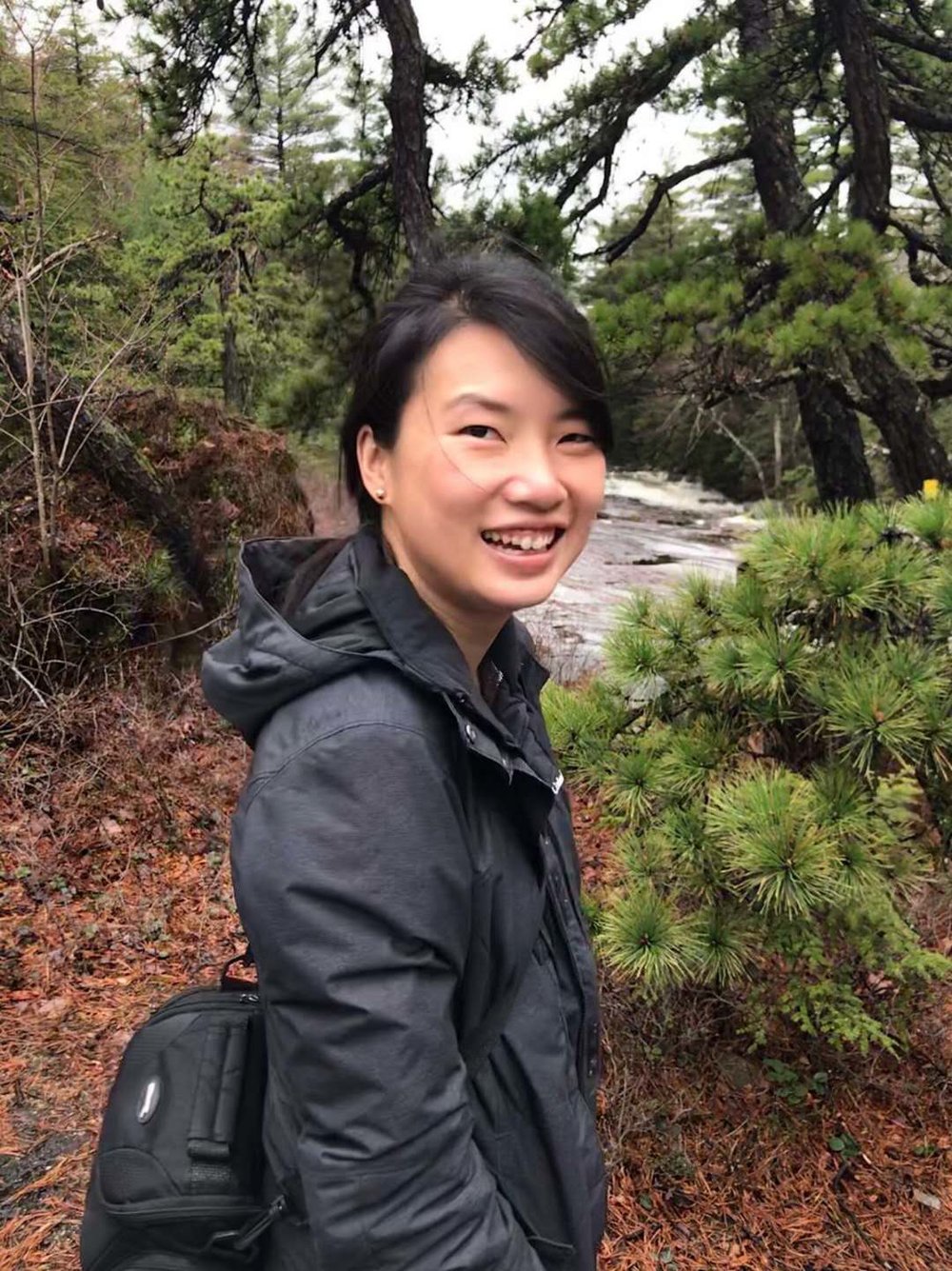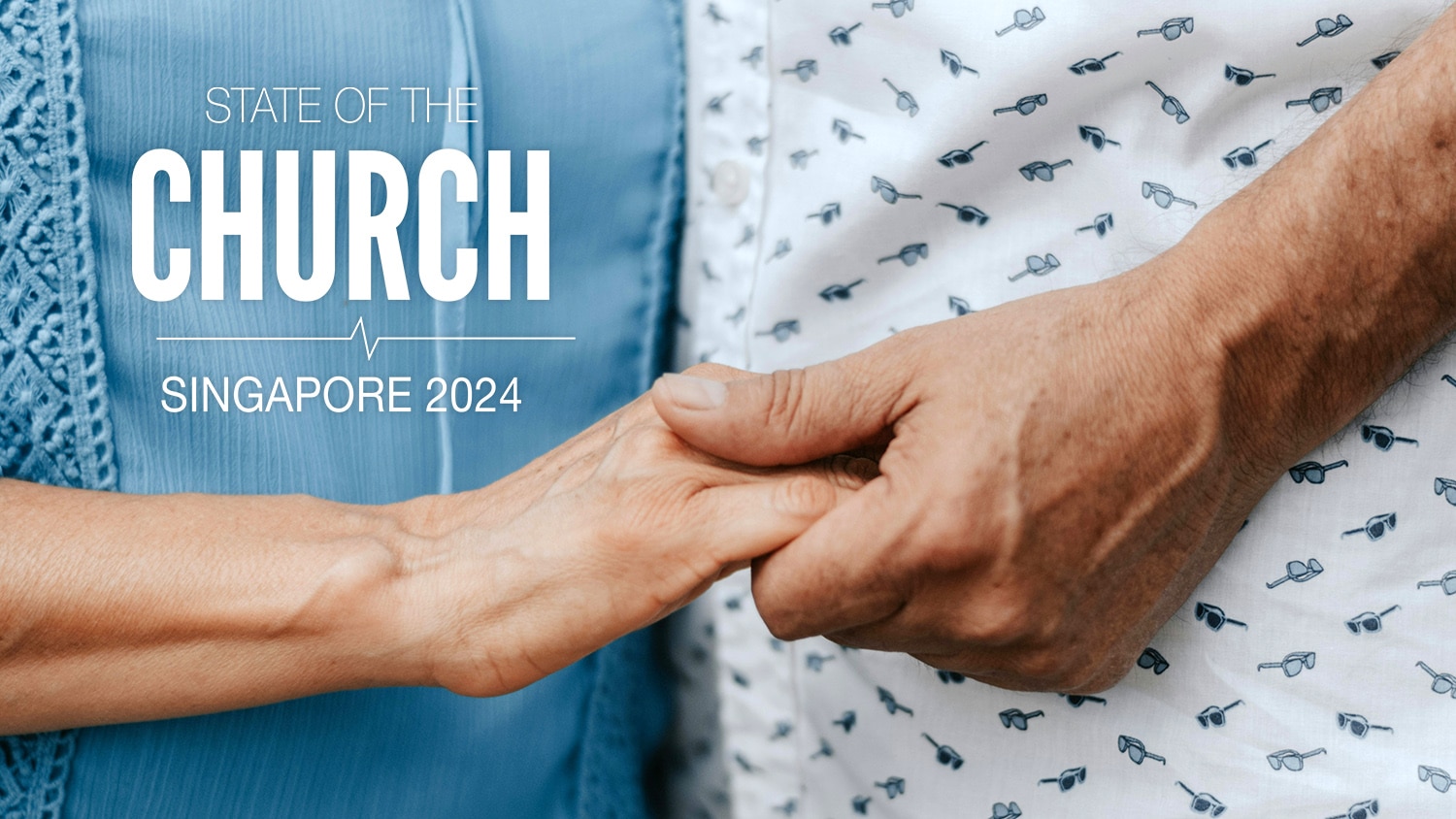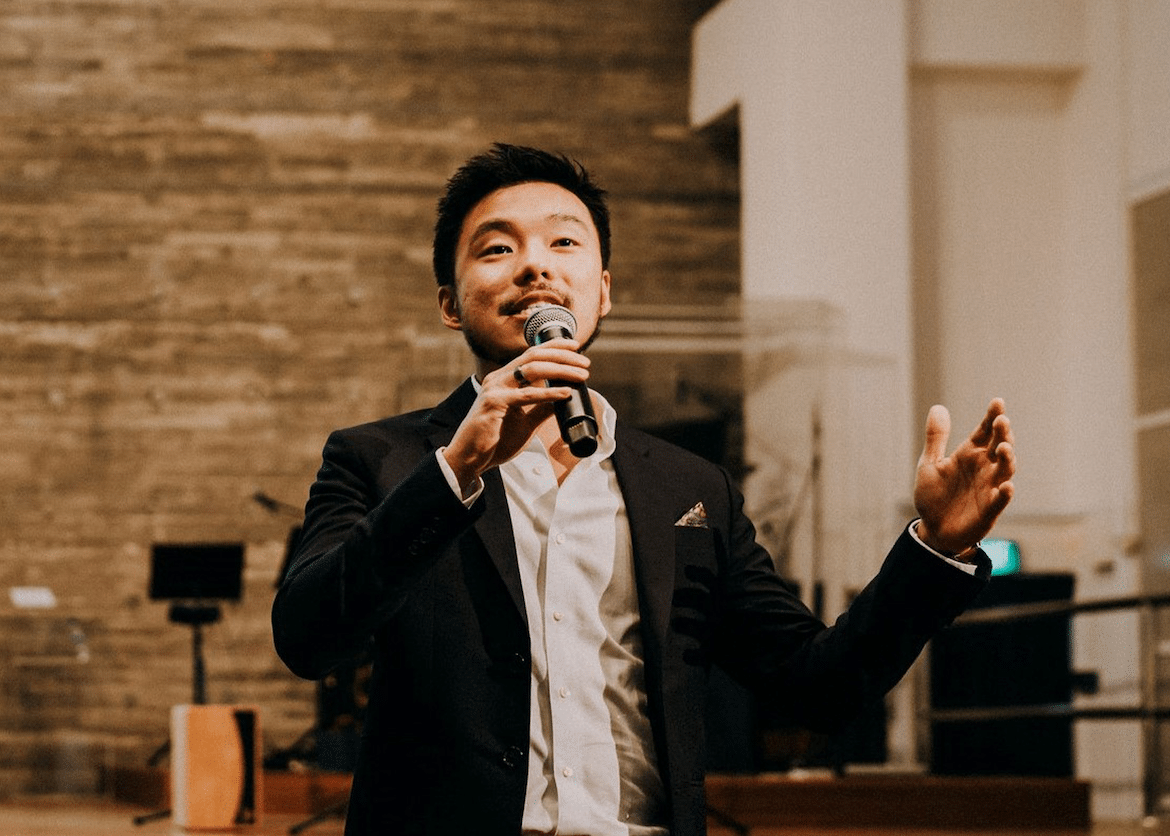Six things the recent IPS surveys reveal about the state of religion in Singapore
Kelly Ng // March 29, 2021, 3:23 pm
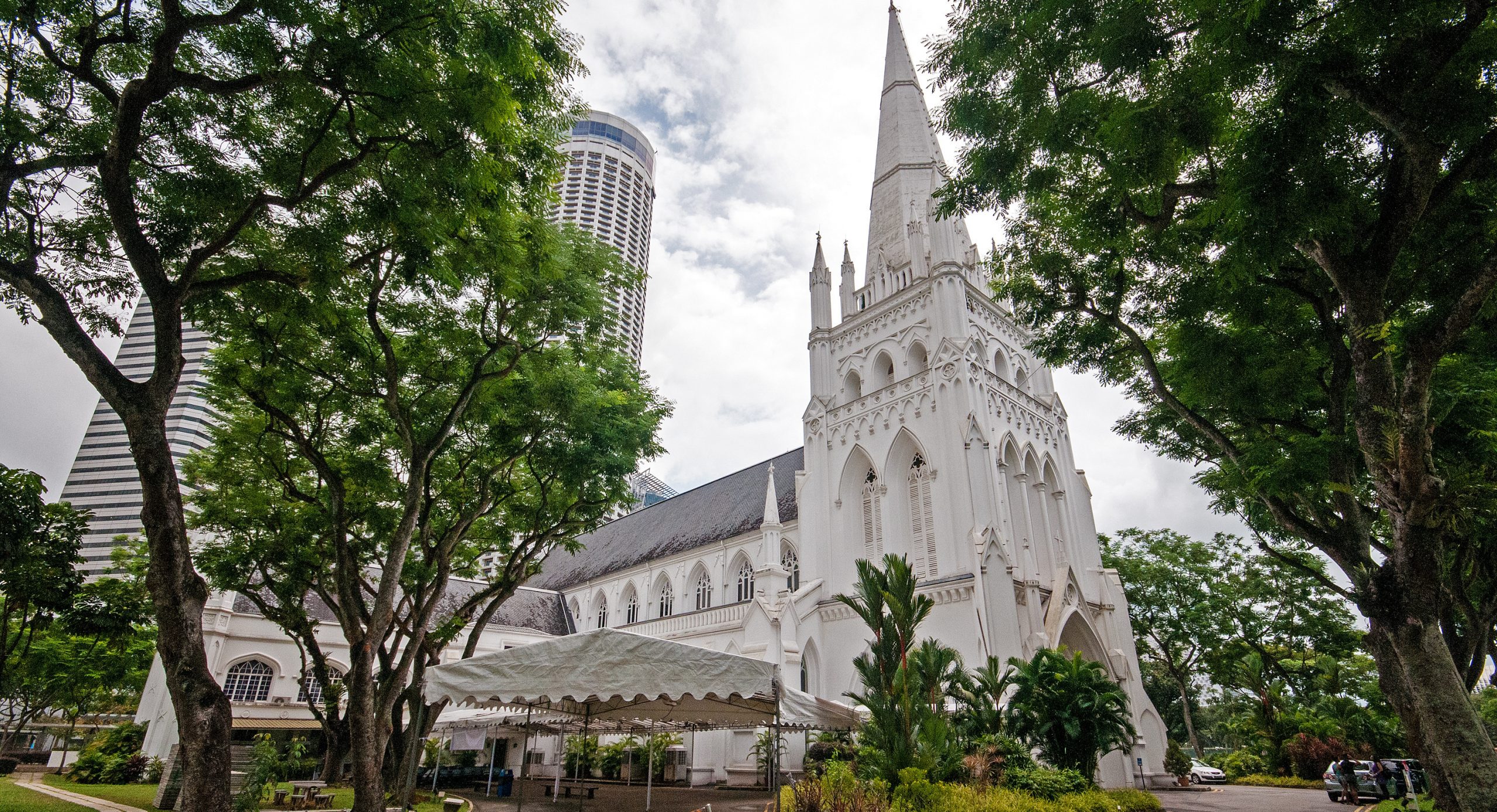
In the latest survey on values by IPS Singapore, Almost three quarters, or 73% , said they looked to religion to “make sense of life in this world”, while 27% said religion helps them “make sense of life after death”. Photo by bvi4092 on Flickr.
The majority of Singaporeans still believe there is a God. But overall religiosity has fallen over the last decade, according to studies by researchers from the Institute of Policy Studies.
As part of the global World Values Survey spanning 80 countries, the researchers surveyed over 2,000 Singapore residents for their views on issues such as politics, religion, and attitudes towards work and family.
Almost 70% of respondents believe in life after death, heaven and hell.
Our Singaporean Values, the first report of a three-part series, found that family has remained Singaporeans’ top priority, while religion and politics remain the lowest priorities.
The second report, Attitudes towards Institutions, Politics, and Policies, found that Singaporeans overall were most confident of state institutions relative to electoral institutions, the media, and civil society, which includes religious organisations. Data collection took place from November 2019 to March 2020.
Salt&Light takes a look at some of the studies’ key findings pertaining to religion.
1. Eight in 10 Singaporeans believe there is a God
This is a higher proportion compared to other Asian societies – 54.8% of Japanese, 46% of Thais and 17% of Chinese said they also believe in a God.
Although respondents with no religion were less likely to believe in a God than those who identified with a religion, among those with no religious affiliation, the study found that those with higher education or more affluence (based on housing type) are more likely to believe in a God.
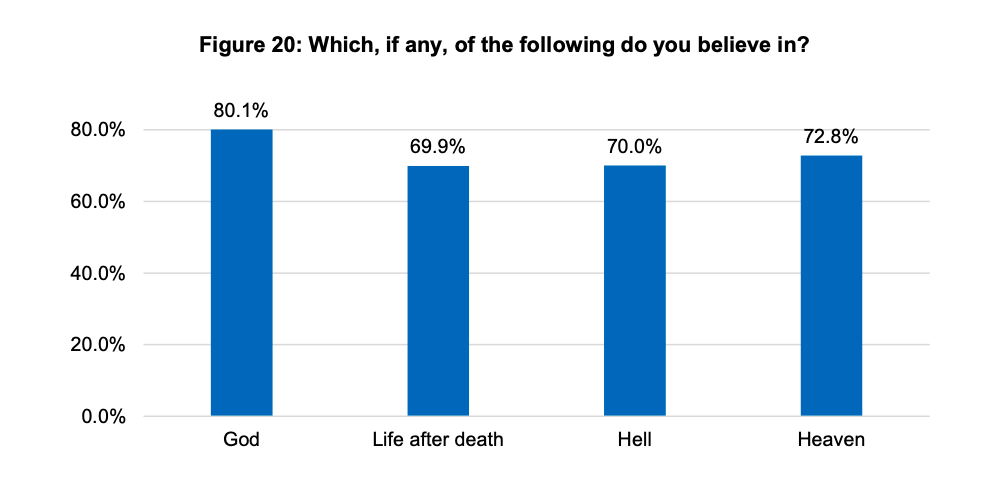
Image from Our Singaporean Values
The majority of respondents also indicated belief in other religious concepts. For example, about 69.9% said they believe in life after death, 70% said they believe in hell, and 72.8% said they believe in heaven.
Compared to other societies, these proportions were on the higher side, together with neighbouring Malaysia, where over 81% believe in life and death, hell, and heaven.
2. Most feel religion helps make sense of this life, rather than life after death
While 34.1% of the respondents felt that religion was “very important” in their lives and 31.2% said that it was “rather important”, 34.7% felt that religion was “not very important” or “not at all important”.
The overall mean score for the importance of God in Singaporeans’ lives fell to 6.7 last year, from 7.19 in 2002.
Gender and age were found to have a certain impact on perceptions of religion, with female and older respondents seeing religion as a higher priority in their lives.
Almost three quarters, or 73%, said they looked to religion to “make sense of life in this world”, while 27% said religion helps them “make sense of life after death”.
Across most religious groups and those with no religion, respondents with higher education levels and higher income tended to seek religion for guidance on worldly matters rather than the afterlife, with a notable exception among the Muslims – Muslims with higher income tended to see religion as helping to make sense of life after death.
3. Overall religiosity has waned over two decades
Although a large majority of respondents still acknowledge the importance of God in their lives, overall religiosity has dropped.
Across several religious groups and non-religious respondents, females tend to attribute greater importance to God in their lives.
About half, or 47.6% of the respondents, said God was quite important, or very important, in their lives. 34.2% said God was somewhat important, while the remaining 18.2% said God was not very important, or not important at all.
Responses to this question were recorded along a 10-point scale, with 1 denoting that God is “not important” and 10 denoting “important”. When examined as a scale, the overall mean score for the importance of God in Singaporeans’ lives fell to 6.7 last year, from 6.95 in 2012 and 7.19 in 2002.
These mean scores varied significantly across religions. For example, Muslims had a mean score of 8.97 and Protestant Christians 8.86, while respondents who have no religion recorded a mean score of 3.84. But even among those who did not identify with a religion, about 51% indicated that God was important in their lives to varying extents.
Across several religious groups and non-religious respondents, females tend to attribute greater importance to God in their lives.
4. Over half considered themselves religious while one in 10 called themselves atheists
This segment was framed such that respondents considered their religious affiliations independent of whether they attended religious services. 56.2% across all respondents said they were a religious people, while 9.6% said they were atheists. The remaining 34.2% said they were not religious.
Among respondents with no religion, 33.8% identified as atheists, but a larger proportion of 57.6% considered themselves non-religious. On the other hand of the spectrum, 81.2% of Protestant respondents said they considered themselves religious.
For Protestants, over three-quarters considered themselves religious across all age groups.
Age appeared to have an impact on self-perceptions of religiosity for most groups. Among respondents with no religious affiliation, older age cohorts were more likely to identify as atheists while the younger ones were more likely to say that they are not religious.
For those with religious affiliations, however, older respondents were more likely to say that they were religious compared to their younger counterparts.
While there were marked differences between the youngest and oldest groups for most religions, this was not the case for Protestants, for which over three-quarters considered themselves religious across all age groups.
There was also an overall negative correlation between respondents’ identification as a “religious person” and socioeconomic status – across most groups, those with higher income levels were less likely to consider themselves religious.
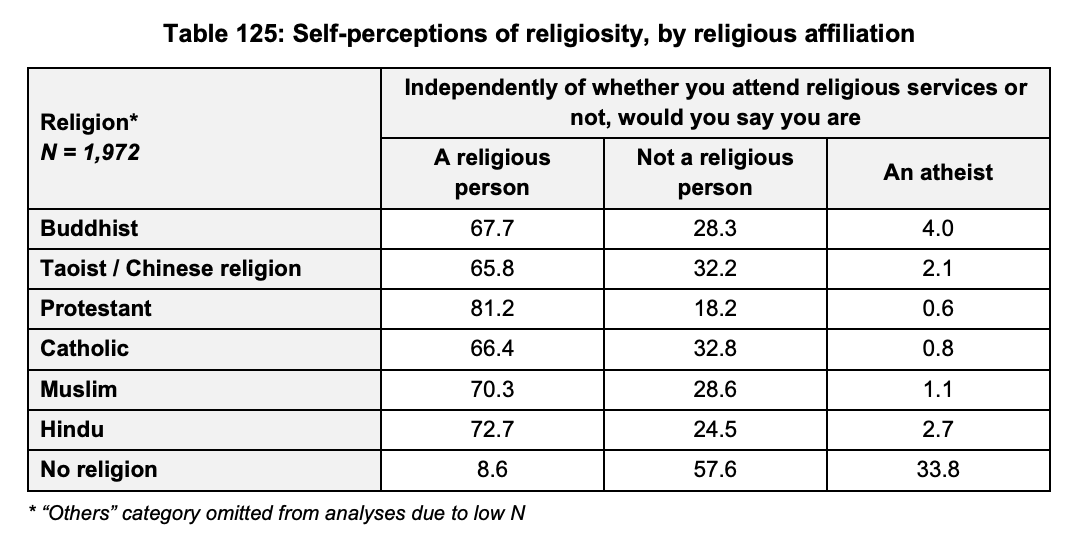
Image from Our Singaporean Values
But there were some discernible differences between groups. Less educated, less affluent Buddhists and Taoists were more likely to identify as religious, whereas more educated, more affluent Catholics were more likely to identify as such.
5. Two in three Singaporeans disagreed that religion trumps science in times of conflict
Two-thirds of respondents indicated their disagreement, or strong disagreement, that “whenever science and religion are in conflict, religion is always right”. Among the religious adherents, though, Muslims and Protestants were more likely to express agreement, or strong agreement, that religion trumped science.
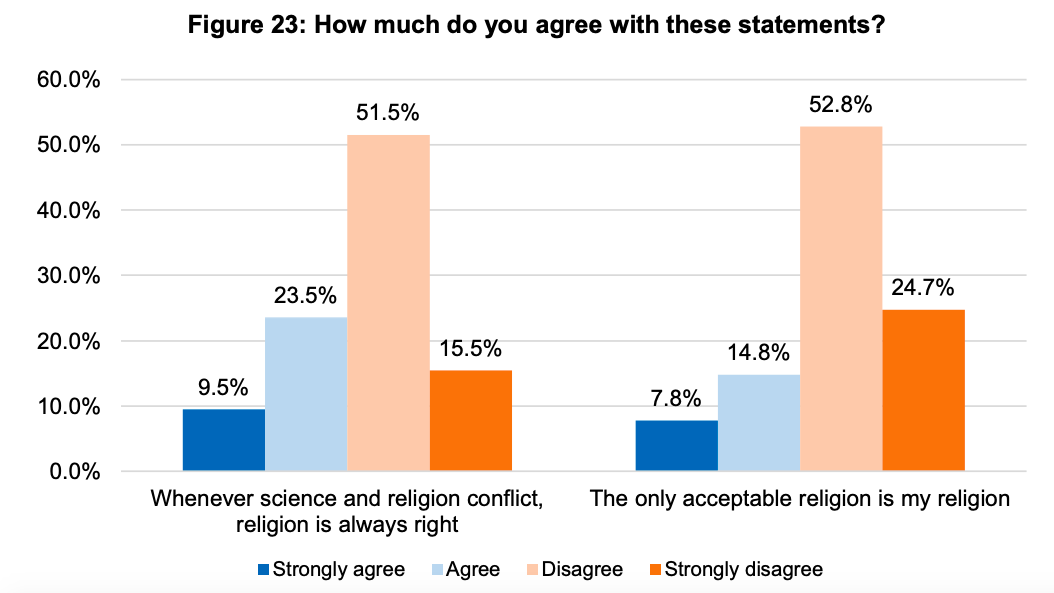
Image from Our Singaporean Values
Age had a different impact for religious and non-religious adherents’ view on this statement. Among respondents with no religious affiliation, younger respondents were more likely to indicate that they strongly disagreed with religion trumping science in times of conflict. In contrast, for Buddhists, Taoists, Protestants, Catholics and Hindus, older respondents were more likely to agree with the statement.
Most respondents also indicated support for religious pluralism.
Overall, most respondents also indicated support for religious pluralism; 52.8% of the respondents disagreed with the statement “the only acceptable religion is my religion”, while 24.7% strongly disagreed.
Zooming into individual groups, the proportions of respondents who showed disagreement for this statement were higher than this overall average among the non-religious and all religious groups, except the Protestants and Muslims.
Younger respondents were typically more likely to express support for religious pluralism, relative to their older counterparts.
6. Six in 10 Singaporeans expressed confidence in religious organisations
Compared to other societies, Singaporeans expressed a higher level of confidence in their religious organisations, with 12.7% of respondents saying they had “a great deal” of confidence in religious organisations, and 47.3% saying they had “quite a lot” of confidence.
This, compared to just 8.9% in Japan expressing a great deal or quite a lot of confidence in their religious organisations, or in China, where the proportion stands at 20.1%. Malaysia and Thailand reported higher proportions of respondents saying they either have a great deal or quite a lot of confidence.
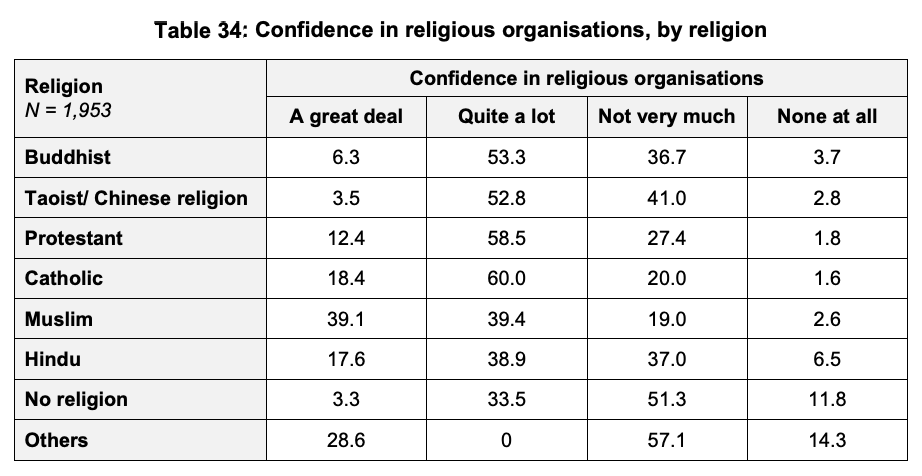
Image from Attitudes Towards Institutions, Politics and Policies.
In Singapore, Muslims expressed the most confidence in religious organisations, with about four in 10 saying they had a great deal of confidence, and another four in 10 indicating “quite a lot”. If the proportions choosing those two categories were combined, Catholics also had a high level of confidence, as 78.4% chose either of these two categories. In contrast, Taoists or practitioners of Chinese religion were the least confident of religious organisations.
IF YOU LIKED THIS STORY, READ:
Did you bring your Light to work today?
7 things we learnt about the state of religion in Singapore from the IPS study
We are an independent, non-profit organisation that relies on the generosity of our readers, such as yourself, to continue serving the kingdom. Every dollar donated goes directly back into our editorial coverage.
Would you consider partnering with us in our kingdom work by supporting us financially, either as a one-off donation, or a recurring pledge?
Support Salt&Light